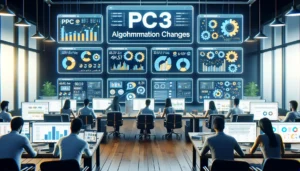The Evolution of PPC: Strategies UK Agencies Use to Stay Ahead

As we look towards the horizon of 2024 and beyond, the landscape of Pay-Per-Click (PPC) advertising is poised for remarkable transformations. Driven by technological advancements and strategic management, the evolution of PPC continues, offering businesses innovative ways to connect with their audiences. This article delves into the key trends that will shape the future of PPC, exploring how emerging technologies, platform updates, and new advertising paradigms will redefine the effectiveness of digital marketing campaigns.
Key Takeaways
- Emerging technologies like AI, machine learning, and augmented reality are revolutionising PPC campaigns.
- Staying updated with platform algorithm changes and new features is crucial for optimising campaign performance.
- Data-driven strategies, including predictive analytics and personalisation, are key to maximising ROI.
- Understanding and leveraging the unique features of different PPC platforms can enhance campaign effectiveness.
- Ethical considerations, such as consumer privacy and transparency, remain essential in modern PPC advertising.
The Evolution of PPC: Harnessing Emerging Technologies in PPC Campaigns
Integrating AI and Machine Learning
Artificial Intelligence (AI) and Machine Learning are revolutionising the way PPC campaigns are managed. These technologies enhance automated bidding, personalisation, and predictive analytics, allowing for more refined and responsive campaigns. By leveraging AI, a PPC eCommerce agency can optimise ad spend and improve targeting accuracy. This results in higher conversion rates and better ROI.
Utilising Augmented Reality in Ads (The Evolution of PPC)
The incorporation of augmented reality (AR) in ads can transform a mundane product display into an interactive experience. This technology allows potential customers to visualise products in their own environment, significantly boosting engagement and conversion rates. For eCommerce PPC, AR can be a game-changer, offering a unique way to showcase products and connect with audiences.
Voice Search Optimisation
With the rise of smart devices, voice search is becoming increasingly important. Optimising your PPC campaigns for voice search involves understanding natural language queries and tailoring your keywords accordingly. This ensures that your ads appear in voice search results, capturing a growing segment of the market. Voice search optimisation is essential for staying ahead in the competitive landscape of digital marketing.
Staying ahead in PPC requires embracing emerging technologies and continuously adapting to new trends. By integrating AI, AR, and voice search optimisation, you can create more effective and engaging campaigns.
The Evolution of PPC: Adapting to Platform Changes for Enhanced Campaigns
Staying Updated with Algorithm Changes
In the ever-evolving PPC landscape, staying updated with algorithm changes is crucial. Platforms frequently update their algorithms, which can significantly impact your campaign performance. Regular audits and proactive adjustments are essential to ensure compliance and prevent any adverse effects. Embrace these changes as opportunities to optimise your campaigns for better performance and higher ROI.
In this ever-evolving PPC ecosystem, your agility in adapting to changes and harnessing the full potential of each tool will define your success.
Leveraging New Features for Better ROI (The Evolution of PPC)
To stay ahead, you must keep abreast of platform updates—each tweak in the algorithm or a new feature could be the key to enhancing your campaigns. Remember, the quality score of your ads is pivotal; it influences cost and positioning, making its optimisation a non-negotiable task. Utilise new features to gain a competitive edge and improve your return on investment.
Case Studies of Successful Adaptations
Examining case studies of successful adaptations can provide valuable insights. For instance, a UK agency recently leveraged a new feature on Google Ads to improve their campaign performance by 20%. By reallocating budgets from underperforming channels to those delivering higher returns, they achieved significant improvements. Regular monitoring and analysis of campaign performance allow for agile budget adjustments, ensuring optimal results.
The Evolution of PPC: Data-Driven Strategies for Maximising ROI
Predictive Analytics in PPC
Predictive analytics can significantly enhance your PPC campaigns by forecasting future trends based on historical data. By leveraging machine learning algorithms, you can predict which keywords and ad placements are likely to yield the highest ROI. This allows for more informed budget allocation and strategic planning. Regularly updating your predictive models ensures they remain accurate and relevant.
Personalisation Through Data Insights (The Evolution of PPC)
Personalisation is key to engaging your audience effectively. By analysing user data, you can tailor your ads to meet the specific needs and preferences of different segments. This not only improves click-through rates but also enhances user experience. Utilise A/B testing to determine which personalised elements resonate most with your audience, and adjust your strategy accordingly.
Measuring and Improving Campaign Performance
To maximise ROI, it’s crucial to continuously measure and improve your campaign performance. Use a combination of metrics such as click-through rates, conversion rates, and cost per acquisition to gauge success. Implementing a robust analytics framework will help you identify underperforming areas and optimise them. Regular A/B testing and performance monitoring are essential practices for ongoing improvement.
Consistent data analysis and iterative optimisation are the cornerstones of a successful PPC strategy. By staying data-driven, you can ensure your campaigns are always performing at their best.
The Evolution of PPC: Navigating the Top PPC Platforms and Tools
As you delve into the dynamic world of PPC in 2024, understanding the landscape of platforms and tools is crucial for your campaign’s success. Selecting the right PPC platform is more than a mere choice; it’s a strategic decision that aligns with your target audience and marketing goals. Google Ads remains the titan of search and display, while platforms like Bing Ads and a plethora of social media advertising options offer unique environments to capture diverse audiences.
The Evolution of PPC: The Synergy Between PPC and Other Marketing Channels
PPC’s agility allows for swift adaptation to market changes, ensuring that your brand remains visible and competitive. Insights from PPC analytics can significantly enhance your content and SEO strategies. By analysing which keywords and ad copies perform best, you can refine your SEO efforts to target high-converting terms. This synergy ensures that both your paid and organic search efforts are aligned, maximising visibility and engagement.
Email marketing campaigns can be fine-tuned based on PPC ad performance. By leveraging data from your PPC campaigns, you can identify which messages resonate most with your audience. This allows you to craft more effective email content that drives higher open and click-through rates. Integrating PPC insights into your email strategy ensures a cohesive and data-driven approach to customer engagement.
Social media engagement can be amplified through targeted PPC ads. By using PPC data to understand your audience’s preferences and behaviors, you can create more compelling social media content. Targeted PPC ads can drive traffic to your social media profiles, increasing followers and engagement. This creates a virtuous cycle where your social media efforts are continuously informed and enhanced by PPC insights.
Remember, a comprehensive digital marketing strategy is not about using a single channel in isolation. It’s about creating a dynamic, integrated ecosystem where PPC plays a pivotal role. By understanding and harnessing the power of PPC within this ecosystem, you position your brand to capitalise on opportunities and navigate the complexities of the digital landscape.
The Evolution of PPC: Ethical Considerations in Modern PPC Advertising
Balancing Automation with Human Oversight
In the realm of PPC, the advent of AI has been a game-changer, offering unprecedented capabilities for targeting and optimisation. However, with great power comes great responsibility. You must ensure that your strategies not only comply with regulations but also uphold the highest ethical standards. This means conducting regular Google ads audits and PPC audits to safeguard against any misuse of data and to maintain transparency with your audience.
As you integrate AI into your PPC campaigns, remember that ethical practices are not just a legal obligation; they are a cornerstone of trust with your customers.
To stay on the right side of ethics, consider these steps:
- Regularly update your knowledge of privacy laws and AI regulations.
- Implement clear policies for data usage and AI applications in your campaigns.
- Engage in open dialogue with stakeholders about the ethical implications of AI in your PPC strategies.
Ensuring Consumer Privacy (The Evolution of PPC)
Advertising regulations vary by jurisdiction, but a common thread is the emphasis on consumer privacy. Maintaining consumer trust is paramount, and this involves being transparent about how you collect, store, and use data. Regular PPC audits can help you identify and rectify any potential privacy issues before they escalate.
Maintaining Transparency and Trust
Beyond legal obligations, ethical conduct in PPC advertising is pivotal for building trust and reputation. Key ethical guidelines include truthfulness in advertising, clear disclosure of sponsored content, and responsible targeting. A PPC agency must prioritise these principles to foster long-term relationships with clients and consumers alike. By maintaining ethical practices and leveraging AI responsibly, you can navigate the ever-changing landscape of digital ads while upholding the trust of your audience.
Conclusion
As we look ahead to 2024 and beyond, the landscape of Pay-Per-Click (PPC) advertising is poised for remarkable transformations. Driven by technological advancements and strategic management, PPC continues to evolve, offering businesses innovative ways to connect with their audiences. The integration of AI, machine learning, and emerging technologies like voice search and augmented reality (AR) are set to redefine the landscape, offering unprecedented levels of personalisation and efficiency. UK agencies that stay agile and embrace these advancements will not only maintain a competitive edge but also drive compelling results for their clients. By continuously adapting to platform changes, leveraging predictive analytics, and focusing on ethical standards, these agencies can navigate the ever-evolving PPC landscape with confidence and success. The future of PPC promises to be an exciting journey of growth and innovation, delivering significant value to businesses and marketers alike.
Frequently Asked Questions
What are the key emerging technologies impacting PPC campaigns?
Emerging technologies such as AI, machine learning, augmented reality (AR), and voice search optimisation are revolutionising PPC campaigns by enabling greater personalisation, efficiency, and interactive ad experiences.
How do UK agencies stay updated with platform changes?
UK agencies stay updated with platform changes by continuously monitoring updates from major PPC platforms, participating in industry forums, and investing in ongoing training and development for their teams.
What role does data play in PPC strategies?
Data is crucial in PPC strategies for predictive analytics, personalisation, and performance measurement. It helps agencies to anticipate consumer behavior, tailor ads to specific audiences, and optimise campaign performance for better ROI.
How can PPC and SEO work together?
PPC and SEO can work together by sharing insights from PPC analytics to inform SEO strategies. For example, high-performing keywords in PPC campaigns can be targeted for organic search optimisation, enhancing overall visibility and engagement.
What ethical considerations are important in PPC advertising?
Key ethical considerations in PPC advertising include balancing automation with human oversight, ensuring consumer privacy, and maintaining transparency and trust with audiences.
What are some platform-specific strategies for PPC?
Platform-specific strategies for PPC involve tailoring campaigns to the unique features and audience behaviours of each platform. For example, using Google Ads for search intent targeting, Facebook Ads for demographic targeting, and LinkedIn Ads for B2B marketing.
Author
Search Blog
Free PPC Audit
Subscribe to our Newsletter
The Voices of Our Success: Your Words, Our Pride
Don't just take our word for it. With over 100+ five-star reviews, we let our work-and our satisfied clients-speak for us.
"We have been working with PPC Geeks for around 6 months and have found Mark and the team to be very impressive. Having worked with a few companies in this and similar sectors, I rate PPC Geeks as the strongest I have come across. They have taken time to understand our business, our market and competitors and supported us to devise a strategy to generate business. I value the expertise Mark and his team provide and trust them to make the best recommendations for the long-term."
~ Just Go, Alasdair Anderson




